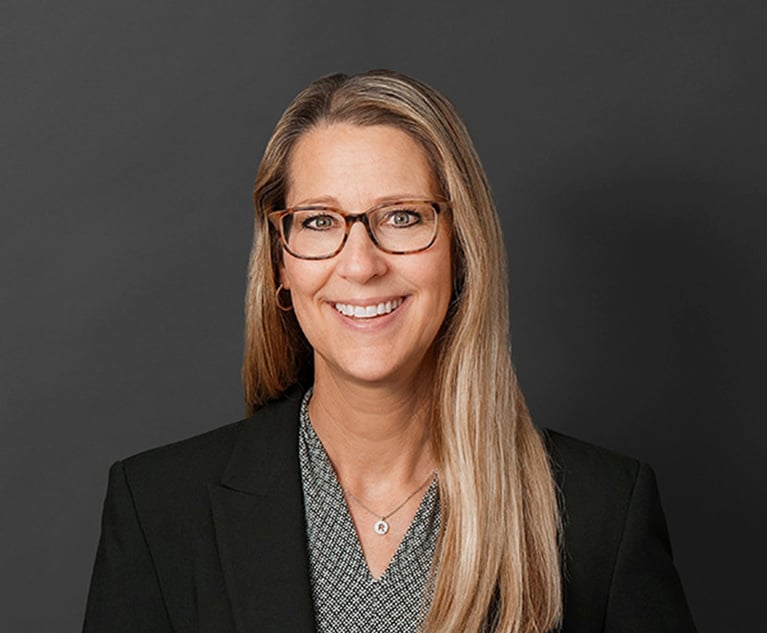FLSA Overtime Class Action Settles for $4.8M, Lawyers Get $1.5M
A group of landscapers suing their employer for overtime pay have settled their class action lawsuit for roughly $4.8 million, with their lawyers netting $1.5 million in fees.
October 09, 2017 at 04:54 PM
3 minute read

A group of landscapers suing their employer for overtime pay have settled their class action lawsuit for roughly $4.8 million, with their lawyers netting $1.5 million in fees.
U.S. District Judge Malachy E. Mannion of the Middle District of Pennsylvania granted final approval of the settlement agreement in Acevedo v. Brightview Landscapes.
The plaintiffs claimed that Brightview Landscape, formerly the Brickman Group, failed to pay overtime to its full-time, salaried supervisors because it paid only half-time overtime pay on a fluctuating workweek basis, according to Mannion's opinion.
The settlement covers 839 workers who were paid by Brightview, formerly known as The Brickman Group, and performed work in Colorado, Connecticut, Delaware, Florida, Georgia, Illinois, Indiana, Kansas, Kentucky, Maryland, Massachusetts, Michigan, Minnesota, Missouri, New Jersey, New York, North Carolina, Ohio, Oregon, Pennsylvania, Rhode Island, South Carolina, Tennessee, Texas, Virginia, Washington or Wisconsin between Oct. 8, 2010, and June 8, 2014.
It covers employees who were paid a salary and were also eligible for half-time overtime fluctuating workweek pay.
Sarah R. Schalman-Bergen of Berger & Montague in Philadelphia represented the class and did not return a call seeking comment. C. Andrew Head of the Head Law Firm was co-lead class counsel with Schalman-BergenBergen.
Brightview's attorney, Daniel E. Turner of Littler Mendelson in Atlanta, did not respond to a request for comment.
All class members are divided into two groups, according to Mannion: Group one consists of 476 Fair Labor Standards Act collective group members who opted in at the start of class action, including all the named plaintiffs, and all collective group members who worked in Pennsylvania, regardless of their original opt-in status.
Group two, with 345 members, consists of all other eligible settlement participants who did not opt-in at the beginning and other than those Pennsylvania workers, who accepted offers to participate in the settlement.
Considering all the factors, Mannion said the settlement was a fair resolution to the litigation.
“The resulting settlement compensates the FLSA collective group for the defendant's potential wrongdoing while taking into account the attendant risks of further litigation,” Mannion said. “The amount received by class members will reflect a pro rata share of the sum of money set aside for claims. This share figure is based on actual timekeeping records of hours worked on an individualized basis.”
“Moreover,” he continued, “the defendant changed its method of computing overtime compensation in June of 2014. Thus, not only will those in the FLSA class be fairly compensated for any potential wrongdoing, employees hired after the defendant's change in pay practices will likely benefit from this action. Thus, the benefits reach beyond the settlement itself. This result clearly furthers the purpose of the FLSA to protect workers and ensure they are paid appropriately. Accordingly, the parties amended settlement agreement will be finally approved with respect to the collective group's FLSA claims.”
P.J. D'Annunzio can be contacted at 215-557-2315 or [email protected]. Follow him on Twitter @PJDannunzioTLI.
This content has been archived. It is available through our partners, LexisNexis® and Bloomberg Law.
To view this content, please continue to their sites.
Not a Lexis Subscriber?
Subscribe Now
Not a Bloomberg Law Subscriber?
Subscribe Now
NOT FOR REPRINT
© 2025 ALM Global, LLC, All Rights Reserved. Request academic re-use from www.copyright.com. All other uses, submit a request to [email protected]. For more information visit Asset & Logo Licensing.
You Might Like
View All


Penn State Dickinson Law Dean Named President-Elect of Association of American Law Schools
Trending Stories
- 1Supreme Court Appears Sympathetic to Law Requiring Porn Sites to Verify Users' Age
- 2Cybersecurity Breaches, Cyberbullying, and Ways to Help Protect Clients From Both
- 3AI in 2025: Five Key Predictions on How It Will Reshape International Law Firms
- 4Justice Known for Asking 'Tough Questions' Resolves to Improve Civility
- 5Robinson & Cole Elects New Partners and Counsel
Who Got The Work
J. Brugh Lower of Gibbons has entered an appearance for industrial equipment supplier Devco Corporation in a pending trademark infringement lawsuit. The suit, accusing the defendant of selling knock-off Graco products, was filed Dec. 18 in New Jersey District Court by Rivkin Radler on behalf of Graco Inc. and Graco Minnesota. The case, assigned to U.S. District Judge Zahid N. Quraishi, is 3:24-cv-11294, Graco Inc. et al v. Devco Corporation.
Who Got The Work
Rebecca Maller-Stein and Kent A. Yalowitz of Arnold & Porter Kaye Scholer have entered their appearances for Hanaco Venture Capital and its executives, Lior Prosor and David Frankel, in a pending securities lawsuit. The action, filed on Dec. 24 in New York Southern District Court by Zell, Aron & Co. on behalf of Goldeneye Advisors, accuses the defendants of negligently and fraudulently managing the plaintiff's $1 million investment. The case, assigned to U.S. District Judge Vernon S. Broderick, is 1:24-cv-09918, Goldeneye Advisors, LLC v. Hanaco Venture Capital, Ltd. et al.
Who Got The Work
Attorneys from A&O Shearman has stepped in as defense counsel for Toronto-Dominion Bank and other defendants in a pending securities class action. The suit, filed Dec. 11 in New York Southern District Court by Bleichmar Fonti & Auld, accuses the defendants of concealing the bank's 'pervasive' deficiencies in regards to its compliance with the Bank Secrecy Act and the quality of its anti-money laundering controls. The case, assigned to U.S. District Judge Arun Subramanian, is 1:24-cv-09445, Gonzalez v. The Toronto-Dominion Bank et al.
Who Got The Work
Crown Castle International, a Pennsylvania company providing shared communications infrastructure, has turned to Luke D. Wolf of Gordon Rees Scully Mansukhani to fend off a pending breach-of-contract lawsuit. The court action, filed Nov. 25 in Michigan Eastern District Court by Hooper Hathaway PC on behalf of The Town Residences LLC, accuses Crown Castle of failing to transfer approximately $30,000 in utility payments from T-Mobile in breach of a roof-top lease and assignment agreement. The case, assigned to U.S. District Judge Susan K. Declercq, is 2:24-cv-13131, The Town Residences LLC v. T-Mobile US, Inc. et al.
Who Got The Work
Wilfred P. Coronato and Daniel M. Schwartz of McCarter & English have stepped in as defense counsel to Electrolux Home Products Inc. in a pending product liability lawsuit. The court action, filed Nov. 26 in New York Eastern District Court by Poulos Lopiccolo PC and Nagel Rice LLP on behalf of David Stern, alleges that the defendant's refrigerators’ drawers and shelving repeatedly break and fall apart within months after purchase. The case, assigned to U.S. District Judge Joan M. Azrack, is 2:24-cv-08204, Stern v. Electrolux Home Products, Inc.
Featured Firms
Law Offices of Gary Martin Hays & Associates, P.C.
(470) 294-1674
Law Offices of Mark E. Salomone
(857) 444-6468
Smith & Hassler
(713) 739-1250






